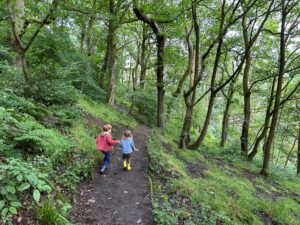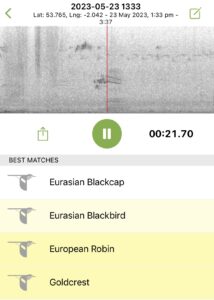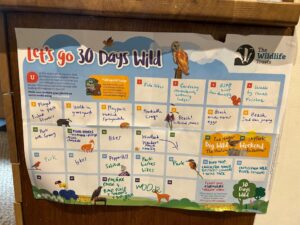As her two-year-old and the birdsong app on her phone develop cognition in parallel, Amy Liptrot looks towards the future.

In the woods, my gallant toddler moves brambles out of my path. He moves at a bold trot or an exploratory dawdle, noticing “creatures”: woodlice, money spiders and — in the undergrowth — a bird. “Robin bird!” says my son. “Eurasian Robin” says the app. I’ve come on a walk with a two-year-old and the Merlin Bird ID app, which listens in real time and identifies the calls around us — an AI and a child both with rapidly developing cognition.
My toddler is a learning machine, evolved to survive, growing neural networks. A year ago he was saying single words, now he can talk in sentences, casually uses irregular verbs and future tense, and asks questions I don’t know how to answer: “Why bees make honey?” My five-year-old, too, has a knack of striking on the big philosophical questions. “What happens at the end of numbers?” he asks, and “Can you get OUT of space?”

They are members of Generation Alpha and could live into the 22nd century, beyond where any ecological models spiral into unpredictability. “Hey Google,” the two-year-old shouts unexpectedly from the back of the car, “play bottoms!”. They both giggle wildly and I remember that a friend’s son’s first word was ‘Alexa’. My boy can swipe and click. He can also jump and kiss. Yesterday was the hottest day ever recorded globally.
Meanwhile, my friends have been amusing themselves by making ChatGPT ‘write like Amy Liptrot’ and sending me the results. I feel worn out and predictable. At the nature reserve after school, both of them are crying as I carry their bikes up a hill. These babies are testing my strength, twisting my melon. Dancing on a high wall, complete mischief and joy in his face, his lifeforce is strong. He will grow, smarter and stronger than his parents, and witness our obsolescence. Nature favours the new.
In June we attempted the Wildlife Trust’s ‘30 Days Wild’, put a calendar up in the kitchen and wrote something everyday we’d done outdoors — from a weekend spent on the beach to ‘watched Springwatch together’. Many days were simply playing in the park after school or out in the street on their bikes. I want to remember moments from the month like three minutes sitting on the heather together looking up, shading our eyes, watching a skylark rise and rise and sing and sing, then the song gradually slowing as it descended. Or when they found a bucket and a rope in a stream and turned them into a machine, a ship, a submarine.

The Merlin app gives greater depth to my world, hearing species I didn’t know were there: willow warbler, goldcrest, long eared owl. It bolsters my knowledge, increasing my confidence in identifying calls. I can listen back to the recordings and hear both birds and children just as they were in this glorious microseason, the things I am trying to remember.